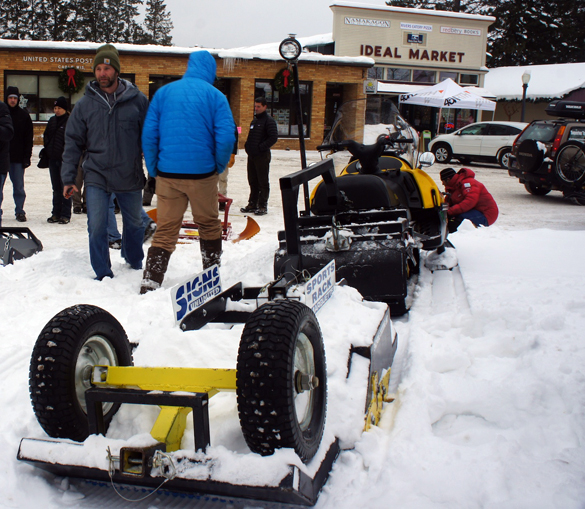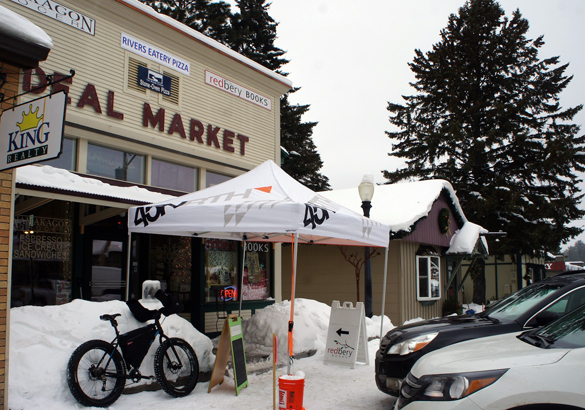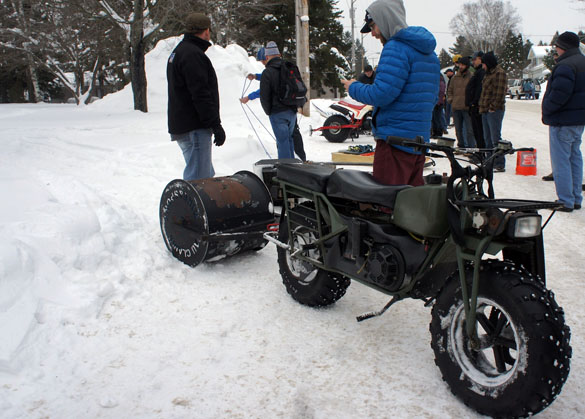Fat Bike Summit brings trail users together
Originally posted on January 14, 2014 at 16:56 pm
Photos by Griff Wigley
The Midwest Fat Bike Access & Grooming Workshop was held on January 9 and 10 in Cable, Wisconsin. This gathering brought together over 70 advocates from Michigan, Minnesota, and Wisconsin devoted to improving off-road cycling and fat biking in winter. The event was sponsored by Quality Bicycle Products (QBP) and hosted by Minnesota Off-Road Cyclists (MORC), International Mountain Bicycling Association (IMBA), and the Chequamegon Area Mountain Bike Association (CAMBA).
Following a late Thursday afternoon/evening fat bike ride by approximately 15 to 20 riders on the newly groomed Esker Trail in the CAMBA trail system’s Cable cluster, participants gathered for the opening reception at the Lakewoods Resort. QBP’s John Gaddo showed “Cold Rolled”, the documentary by Clear & Cold Cinema featuring the 15-mile winter singletrack Snow Bike Route (SBR) in the Noquemanon Trails Network in Marquette, Michigan. You can watch it here.

The workshop was held at The Rivers Eatery in Cable. QBP advocacy director Gary Sjoquist and QBP 45NRTH brand manager David Gabrys opened Friday’s session for the 70-plus attendees, which included representatives from upper Midwest mountain bike and Nordic ski clubs, as well as land managers from state DNR, the U.S. Forest Service, and various city and county park systems. The opening presentations included an overview of the history of fat bikes, how and where they are being used, and industry trends for fat biking. IMBA’s Midwest Regional Director Hansi Johnson spoke about the economic impact of fat biking, the demographics, and the evolution of fat bike best practices.
Different types of fat bike trail categories were then defined and detailed. For example, in the upper Midwest, most fat bike use is occurring in the winter on existing mountain bike trails, as mountain bikers who love the variability of singletrack in the summer seek a similar riding experience in winter. There’s also growing interest in using fat bikes on frozen lakes, rivers, and other winter backcountry areas in the upper Midwest that aren’t rideable in warmer months.

The other main fat bike trail category, referred to as “negotiated access” involves Nordic ski trails and snowmobile trails. The availability of these trails varies widely around the region, from open access to complete prohibition. Many snowmobile trails by virtue of Grant-in-Aid funding and land easements are open only to snowmobiles. Fat bike use of groomed Nordic ski trails is very limited in the region at this time. Several examples of shared trail use occurring in the Western U.S., where the terrain, greater snow depth, and other factors make grooming of singletrack less practical were also presented.
Among the challenges faced in the upper Midwest for shared trail usage are: fear of fat biking damage to Nordic trails and user conflicts, fear of snowmobile collisions with fat bikes, and usage fees. There was a general consensus among those in attendance that it will be better to focus fat biking trail efforts on the winter use of existing mountain bike trails and to go very slow and carefully when it comes to shared trail use.
Additional short presentations from representatives of upper Midwest mountain bike chapters described the fat biking-related activities in their trail systems, including grooming techniques and equipment they are using, both human-powered (e.g., snowshoes) and mechanized.

The final session of the workshop was an outdoor display and demonstration of winter grooming equipment and informal discussion of grooming techniques. Over a dozen different implements, most homemade, were on display. There was considerable discussion and sharing among participants about various pulling devices such as smaller snowmobiles, Rokon two-wheel drive motorcycle, and a Yamaha trail cycle.
At the conclusion of the workshop most participants enjoyed another ride on one of the area CAMBA trails.